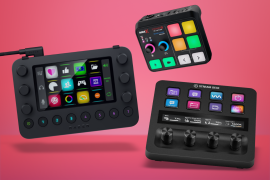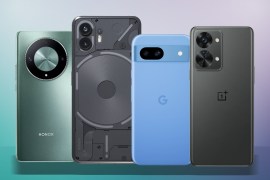Best laptops in 2025 that we’ve reviewed
From MacBooks to Chromebooks, hybrids to gaming powerhouses, we've tested and scored the best laptops for every need

Whether you need a laptop for work, play, or something else entirely, having the best laptop for your needs can make all the difference in getting things done efficiently.
With major leaps in AI integration, efficiency-focused chipsets, and game-changing battery life thanks to next-gen silicon from Apple, Intel, and AMD, 2025’s top notebooks are leaner, faster, and smarter than ever. Many ditch the fan altogether without breaking a sweat, while others handle ray-traced gaming and 4K editing on the fly. Compared to models even two years ago, you’ll see huge improvements in performance-per-watt, portability, and display quality – making now a very smart time to upgrade.
If you’re on the hunt for a new notebook, you’ve come to the right place. We’ve carefully tested and reviewed the top laptops for every task and budget, and we’re highlighting our favourites for you here.
From sleek MacBooks designed for creative professionals to budget-friendly Chromebooks for everyday use, and from versatile 2-in-1 hybrids to high-performance gaming laptops, our list covers a wide variety of options. Each model has been rigorously tested and scored to help you find the ideal laptop that meets your specific needs.
Whether you’re looking for portability, power, or something in between, we’ve got you covered. Plus, we’ve included detailed specifications for each entry so you can easily compare and find the best fit for you.
Why you can trust Stuff: Our team of experts rigorously test each product and provide honest, unbiased reviews to help you make informed decisions. For more details, read how we test and rate products.
Quick list: what’s the best laptop?
We think the Apple MacBook Air M3 (buy now) is the best laptop for most people. This streamlined machine comes with a revamped design and top-spec Apple silicon – setting a new bar for performance and delivering more than enough power for most users. Yes, it’s on the expensive side, but the build quality, power, and long battery life make it worth the high price, in our eyes.
The Dell XPS 14 (buy now) offers superb performance, a stunning display and a streamlined design make this one of the best premium ultraportables for computing on the go.
The Microsoft Surface Laptop Go 3 (buy now) offers the appeal of Microsoft’s premium laptops at a more palatable price. It is a highly portable tool that’s perfect for students. Made from aluminium with a 12.4in PixelSense display, this is a great laptop for the price.
The Apple MacBook Pro M2 (buy now) is, essentially, a more powerful version of the MacBook Air above. With the M2 Pro or Max chip, it’s more capable, has more ports, and comes with a stunning display.
The Asus Zenbook Pro 14 OLED (buy now) certainly doesn’t skimp on power. It’s designed for creative types, with the Studio version of Nvidia’s 4000-series mobile graphics chips and some of the fastest Intel internals money can buy.
The Samsung Galaxy Book4 Edge (but now) is a beautifully premium (and impressively light) powerhouse, with a dazzling display, a large trackpad and keyboard for smashing through tasks, and all-day battery life for on-the-go productivity.
The MateBook X Pro (buy now) is Huawei’s skinniest laptop yet and delivers rapid performance and a stunning screen – but you’ll pay handsomely to take one home.
The Asus ROG Zephyrus G16 (buy now) is part uncompromising gaming laptop, part portable creative powerhouse. It is a superb (and superbly expensive) machine that is up there with Apple MacBooks for slick construction.
The Lenovo Yoga Slim 7x (buy now) is a slim and speedy ultraportable almost keeps pace with the MacBook Air on battery life. Windows on ARM isn’t perfect yet, but it’s otherwise a great all-rounder.
The Microsoft Surface Pro 9 (buy now) provides excellent performance throughout. You’ll be beguiled by the gorgeous screen and lightweight design. Though you should avoid the ARM-based model.
The Acer Chromebook Plus 515 (buy now) is a welcome hardware step up for Chrome OS. If Chromebooks were a familiar sight at school, the Acer Chromebook Plus 515 will make the ideal everyday upgrade.
The best laptops you can buy today:
Best laptop overall
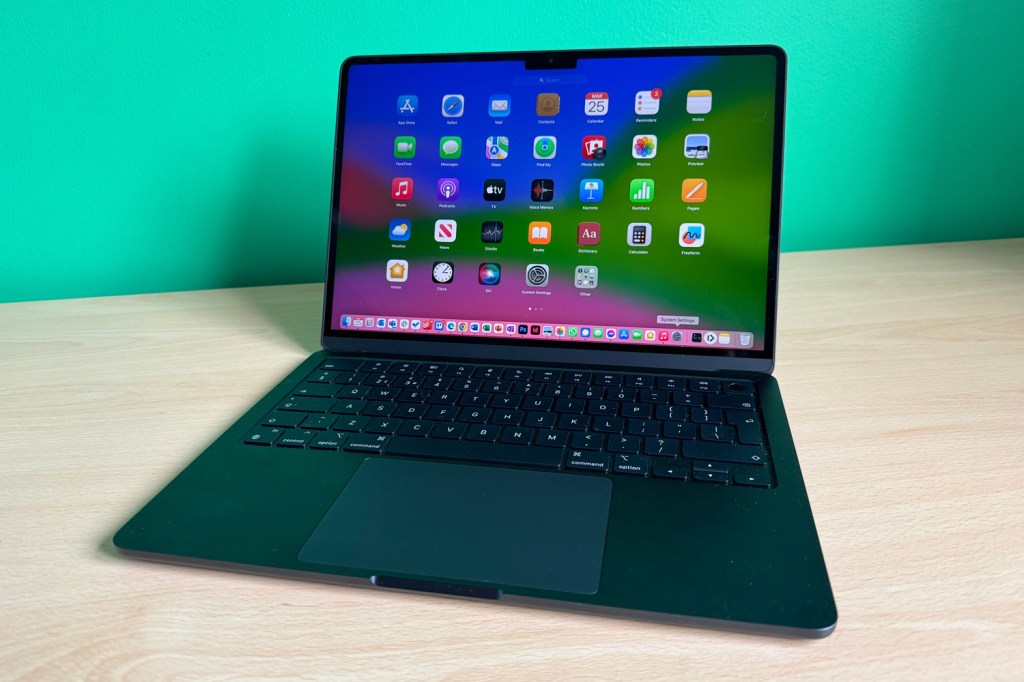
1. Apple MacBook Air (M3)
Stuff Verdict
Yes, the best everyday ultraportable is now even better – the gauntlet has been laid down for Intel laptops again.
Pros
- Beautifully designed
- Super light
- Superb keyboard
Cons
- Upgrades can be very expensive
- Very similar to the M2 Air
| Apple MacBook Air (M3) specs | |
|---|---|
| Screen | 13.6in 2560×1664 60Hz LED |
| Processor | Apple M3 |
| RAM | 8GB/16GB/24GB |
| Storage | 256GB/512GB/1TB/2TB SSD |
| OS | macOS Sonoma |
| Connectivity | 802.11ax Wi-Fi 6; Bluetooth 5.0; 3.5mm headphone; 2×Thunderbolt 3 (USB 4); MagSafe |
| Dimensions | 30.41×21.5×1.13cm; 1.24kg |
The MacBook Air M3 is the best laptop for most people due to its excellent performance and efficiency. The M3 chip offers significant speed and graphics improvements, capable of handling anything you throw at it. Its energy efficiency leads to impressive battery life, lasting up to 15-18 hours, making it ideal for extended use without frequent recharges.
We love the sleek, lightweight design that ensures portability, making it perfect for if you frequently travel with your laptop. The unibody aluminium build is durable and feels like the most premium laptop around.
On top of that, the high-resolution Retina display has excellent colour accuracy and enhanced speakers make it great for watching films and listening to music.
Add macOS Sonoma, the outstanding Magic Keyboard and responsive trackpad, and you’ve got yourself the complete package.
- Read more: Apple MacBook Air (M3) review
Best Windows laptop
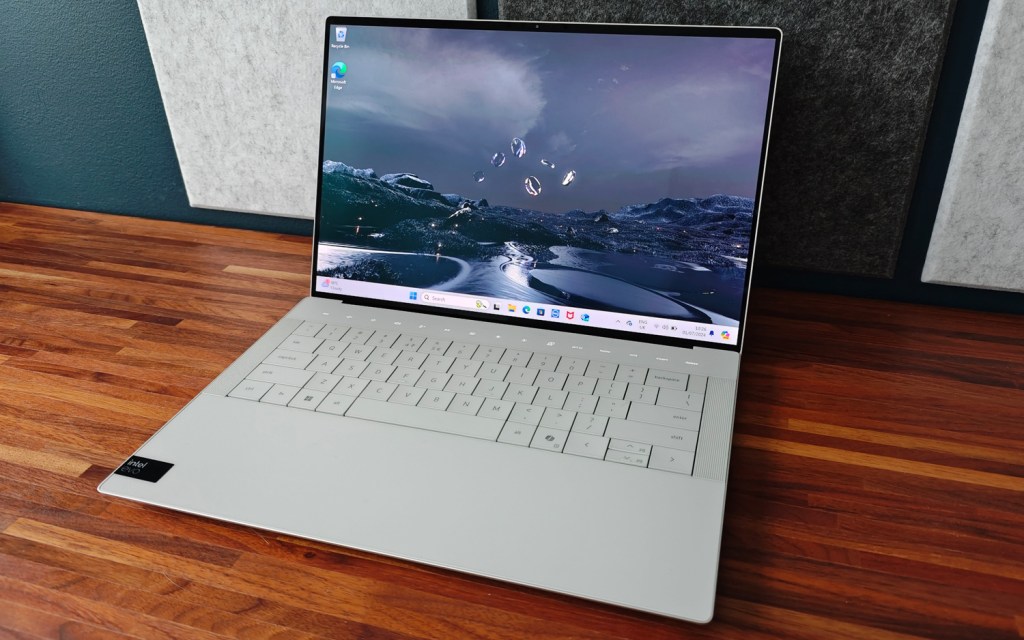
2. Dell XPS 14
| Dell XPS 13 (9310) specs | |
|---|---|
| Screen | 14.5in, 3200×2000 OLED w/ 120Hz |
| Processor | Intel Core Ultra 7 155H / Nvidia GeForce RTX 4050 |
| RAM | 32GB RAM |
| Storage | 1TB SSD |
| OS | Windows 11 |
| Connectivity | USB-C x3, 3.5mm headphone port, microSD card slot |
| Dimensions | 320x216x18mm, 1.72kg |
We’ve had the chance to explore the Dell XPS 14, and it’s clear that this premium laptop brings a lot to the table. Dell’s signature blend of elegance and performance is fully realized here, with the XPS 14 boasting a stunning 14-inch OLED display that delivers vibrant colours, deep blacks, and a smooth 120Hz refresh rate. It’s a fantastic screen for both creative work and entertainment, offering exceptional clarity for everything from photo editing to streaming.
Performance-wise, the XPS 14 impresses with its Intel Core Ultra processor and Nvidia RTX 4050 GPU, which means it’s more than capable of handling demanding tasks. Whether you’re diving into 3D modelling, video editing, or gaming, this laptop doesn’t disappoint. We especially appreciated how Dell managed to pack this level of power into such a sleek, portable design.
The build quality is top-notch, with a premium aluminium and glass finish, and it’s packed with useful features like up-firing speakers for clearer sound and a quick, accurate fingerprint sensor. While it may face tough competition, particularly from MacBooks, the XPS 14 excels in delivering style, performance, and a fantastic display—perfect for those who want a premium, versatile machine.
- Read more: Dell XPS 14 review
Best pro laptop
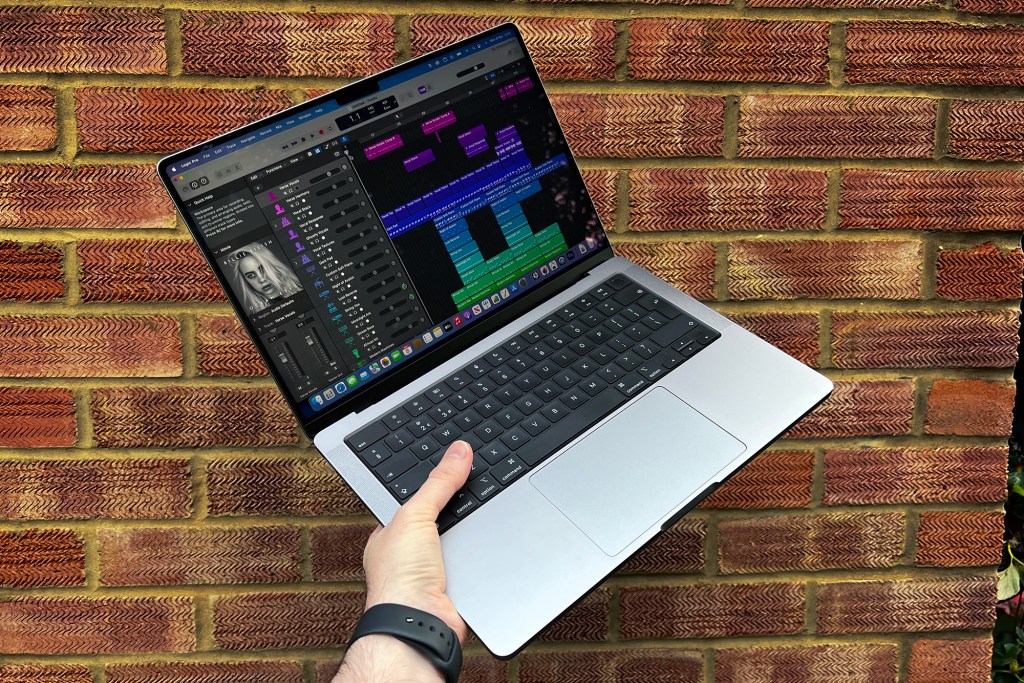
3. Apple MacBook Pro 16in (M2 Pro)
Stuff Verdict
A MacBook Pro deserving of its moniker, this delivers supreme performance – at a price
Pros
- Blazing fast performance from M2 Pro and Max
- Truly outstanding display
Cons
- Overkill for some
- Seriously expensive
| Apple MacBook Pro 16in (M2 Pro) specs | |
|---|---|
| Screen | 16.2-inch Liquid Retina XDR 3456×2234 with P3, True Tone and ProMotion |
| Processor | Apple M2 Pro or M2 Max |
| RAM | 16GB/32GB configurable to 64GB/96GB if you have M2 Max |
| Storage | 512GB/1TB SSD configurable up to 8TB |
| OS | macOS Ventura |
| Connectivity | 802.11ax Wi‑Fi 6E; Bluetooth 5.3; 3.5mm headphone; 3x Thunderbolt 4; MagSafe 3; HDMI; SDXC |
| Dimensions | 35.6 x 24.8 x 1.7cm; 2.16kg |
Heftier than its 13in predecessor, the redesigned MacBook Pro 16in means business. And thanks to Apple’s 2023 M2 Pro or Max chip, it has power in spades. This could be said of the 2021 M1 versions of either, too. The boosted multi-core performance and GPU grunt puts it leagues ahead of competitors. Its performance ceiling is higher than most people will ever need. But for those with serious tasks to churn through, the Pro has the chops to conquer the lot.
With menu bars spanning the notch at the top of the screen, you get a full 16:10 display area below. The mini-LED panel is simply gorgeous, with rich blacks, vivid colour and brightness that hits up to 1600 nits. And that’s all complemented by a punchy six-speaker system.
Yes, it’s overkill if you don’t need its power and ports. But if you work in a field that can take advantage of its skills you won’t be disappointed. Even if you simply want the best laptop in its class.
- Read more: Apple MacBook Pro 16in (2023) review
Best cheap laptop
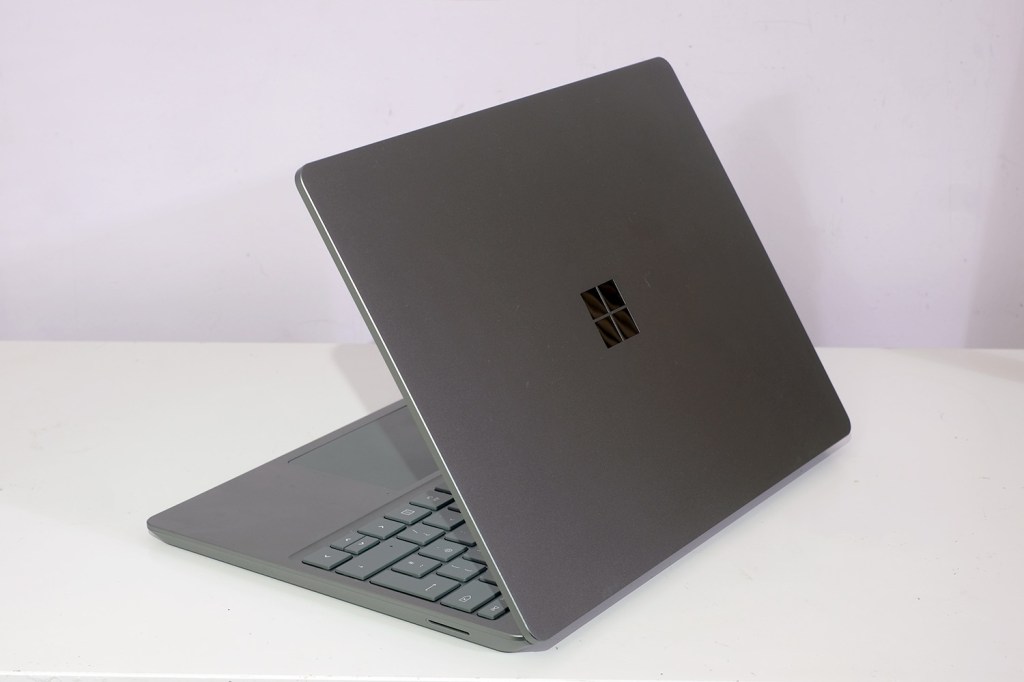
4. Microsoft Surface Laptop Go 3
Stuff Verdict
Microsoft hasn’t made big changes to the series in the Surface Laptop Go 3, and it doesn’t have an up-to-date CPU either. But it’s still a sound option for those who want something super-portable.
Pros
- Attractive design
- Quiet (but not always silent)
- Good key feel
Cons
- Significantly increased entry price
- Uses last-gen processor
- Basic plastic touchpad
| Microsoft Surface Laptop Go 3 specs | |
|---|---|
| Screen | 12.4in, 1536×1024 |
| Processor | 12th Gen Intel Core i5-1235U |
| RAM | 8GB/16GB (tested) |
| Storage | 256GB |
| Graphics | Intel Iris Xe Graphics |
| OS | Windows 11 Home |
| Connectivity | Wi-Fi 6, Bluetooth 5.1, 1x USB-C, 1x USB-A, 3.5mm |
| Dimensions | 278x206x15.7mm, 1.13kg |
The Surface Laptop Go 3 remains a solid choice for those seeking a lightweight, portable laptop with a sleek design. While Microsoft hasn’t introduced major changes, and the last-gen Intel processor is a letdown, the laptop’s aesthetics still shine with its aluminum lid and choice of stylish colors. We appreciate its compact design, weighing just 1.12kg, making it perfect for everyday use.
The 3:2 touchscreen is functional, though we find its resolution lacking for this price range. It’s not the sharpest, especially compared to rivals like the MacBook Air. The keyboard offers a comfortable typing experience, but the lack of a backlight feels like a missed opportunity.
Performance is decent for basic tasks, but the 12th-gen Intel Core i5 limits its power compared to newer competitors. We found it struggles with more intensive activities, though it’s great for everyday productivity. Battery life is acceptable but not remarkable, with about nine hours of light use.
Overall, the Surface Laptop Go 3 is still a strong contender for students or budget-conscious users who prioritize portability and style, but Microsoft needs to improve the screen resolution and add a few extra features to justify its price hike.
- Read more: Microsoft Surface Laptop Go 3 review
Best laptop for creatives

5. Asus Zenbook Pro 14 OLED
| Asus Zenbook Pro 14 OLED specs | |
|---|---|
| Screen | 14.5in, 2880×1800 OLED w/ 120Hz, HDR |
| Processor | Intel Core i9-13900H |
| RAM | 32GB |
| Storage | 2GB SSD |
| Graphics | Nvidia GeForce RTX 4070 |
| OS | Windows 11 |
| Connectivity | Wi-Fi 6E(802.11ax); Bluetooth 5.3; Thunderbolt 4; USB-C; USB 3.2 Type-A; SD card reader; HDMI; 3.5mm headphone port |
| Dimensions | 32.18×22.33×1.79 cm; 1.6kg |
Unlike the rather niche Zenbook Pro Duo, this laptop is a lot more traditional – but doesn’t skimp on power. It’s designed for creative types (the Pro in the name being rather appropriate), with the Studio version of Nvidia’s 4000-series mobile graphics chips and some of the fastest Intel internals money can buy. It’ll play nicely with industry-standard software. And then happily play games at high settings once you clock off for the day.
It’s not especially quiet when you do so, and battery life will take a thrashing. But that’s what headphones and power brick are for. Otherwise, the Zenbook Pro 14 OLED is a wonderfully compact and transportable machine, with plenty of ports and a simply gorgeous 14.5in OLED panel. The 2880×1800 resolution is super sharp for both work and play, with a 120Hz refresh rate ensuring smooth scrolling.
There’s no denying it’s a pricey system, but Asus has managed to undercut the equivalent MacBook Pro – which isn’t as adept at gaming, and misses out on OLED display tech. If you’re all in on Windows over macOS, it’s a fantastic machine.
- Read more: Asus Zenbook Pro 14 OLED review
Best laptop for travel

6. Samsung Galaxy Book4 Edge
| Samsung Galaxy Book4 Edge specs | |
|---|---|
| Screen | 16in 2880 x 1800 AMOLED touchscreen, 120Hz |
| Processor | Snapdragon X Elite X1E-84-100 |
| RAM | 16GB |
| Storage | 1TB SSD |
| OS | Windows 11 Home |
| Connectivity | Wi-Fi 7, Bluetooth 5.3, 2x USB4, 1x USB-A, HDMI 2.1, microSD, 3.5mm audio |
| Dimensions | 355.4 x 250.4 x 12.3mm; 1.55kg |
Samsung’s 16in laptop is quite the looker, with a beautifully premium build that’s a joy to handle. It’s also impressively light for its 16in size — at just 1.55kg, we’ve slung it into bags and carried it around all day without any complaints, which is something that can’t be said for many other laptops in this size range.
The star of the show though, is its objectively gorgeous 16in AMOLED display. With its 2880 x 1800 resolution and 120Hz refresh rate, everything from mundane spreadsheets to visually stunning movie binges, are positively mesmerizing. The deep blacks and punchy colours that OLED screens are renowned for will, quite honestly, ruin any other non-OLED laptop screen for you in future. A blessing, and a curse of sorts, but one that we’d be more than happy to live with when things look this good.
There’s plenty of brawn brimming away beneath this beauty too. Under the hood, Qualcomm’s beastly, top-level Snapdragon X Elite processor flexes its powerful silicon muscles, handling everything from office tasks to more demanding creative work without remotely breaking a sweat. There’s enough grunt here to cater to gaming too — though with many games not optimised for Qualcomm’s ARM chips compared to the long-established Intel offerings, we’d recommend not opting for a Snapdragon X-powered machine specifically with plenty of gaming in mind. For now, at least.
The Book4 Edge’s full-sized keyboard (complete with a number pad!) is a joy to type on, making long work sessions feel less like a chore. And let’s not forget the generously sized trackpad – it’s so big you might mistake it for a small tablet, with plenty of room for your fingers to skim across the surface without ever running out of room.
While the Galaxy Book4 Edge’s AI features (courtesy of Windows’ Copilot) don’t exactly blow our minds, they’re a nice-to-have addition that might come in handy every now and then. This isn’t a dig at Samsung’s effort either — all Windows Copilot PCs serve up the same experience, which we hope will blossom into something more useful as time goes on.
As for battery life — it’s solid, easily lasting a full workday without you having to scramble for a charger, which ticks one of our main boxes. It might not set any records compared to some other rivals which can last a few hours more, but for most people, a full day on one charge should be more than sufficient. Connectivity-wise, Samsung’s got you covered with a smorgasbord of ports, including HDMI 2.1, and even a microSD slot. There’s also Wi-Fi 7 support, future-proofing your blazing-fast connectivity needs nicely.
- Read more: Samsung Galaxy Book4 Edge
Best Macbook alternative
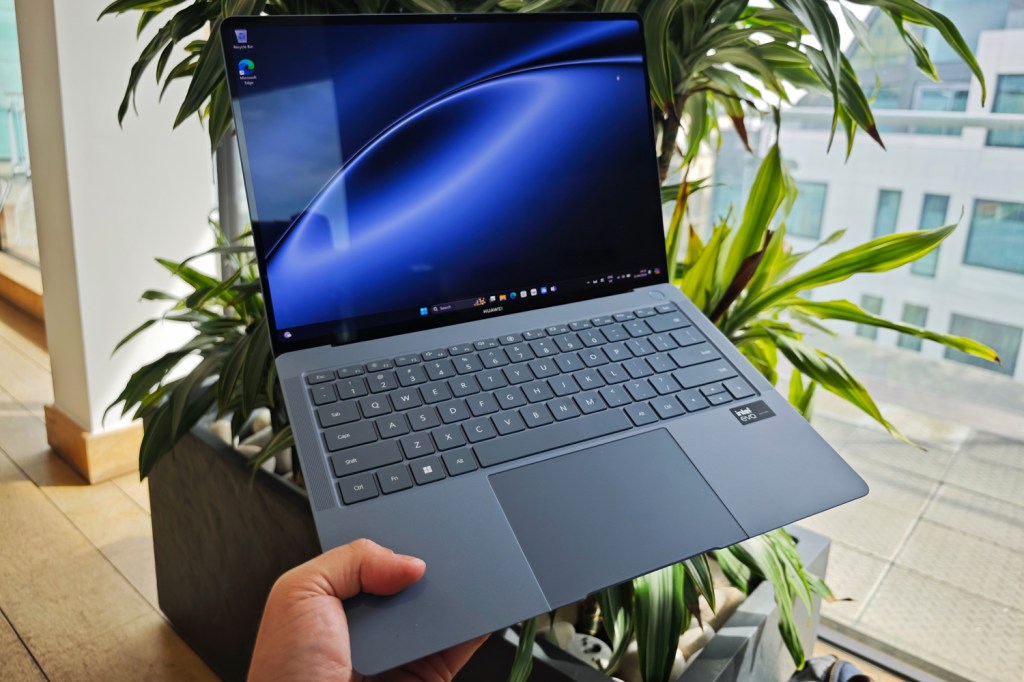
7. Huawei Matebook X Pro
| Huawei Matebook X Pro specs | |
|---|---|
| Screen | 14.2in, 3120×2080 OLED w/ 120Hz refresh rate, 1000 nits brightness |
| Processor | Intel Core Ultra 9 185H |
| RAM | 16/32GB RAM |
| Storage | 1TB/2TB SSD |
| Graphics | Intel Arc integrated |
| Operating system | Windows 11 |
| Connectivity | Thunderbolt 4 × 2, USB-C |
| Dimensions | 310 x 222 x 13.5 mm, 980 g |
With the Huawei MateBook X Pro (2024), and it’s clear Huawei has taken portability to the next level. Weighing just 980g, this ultraportable laptop is one of the lightest we’ve ever used, making it ideal for travel. Despite its slim build, the performance is impressive, powered by Intel’s Ultra 9 CPU and paired with a stunning 14.2-inch OLED display. The screen’s sharpness, vibrant colors, and smooth 120Hz refresh rate made working on creative projects a breeze.
However, this power comes at a price – both in terms of cost and battery life. The MateBook X Pro is quite expensive, and while it delivers solid performance, it falls short of the MacBook Air M3 and Snapdragon X Elite laptops in terms of battery longevity. Connectivity is also limited, with just three USB-C ports and no headphone jack.
In the end, if you’re a Windows user seeking high performance in a lightweight, beautifully designed package, this could be worth considering. But for the price, other options may offer better value depending on your needs. Overall, it’s a top-notch laptop, but you’ll pay a premium for it.
- Read more: Huawei MateBook X Pro review
Best all-round laptop
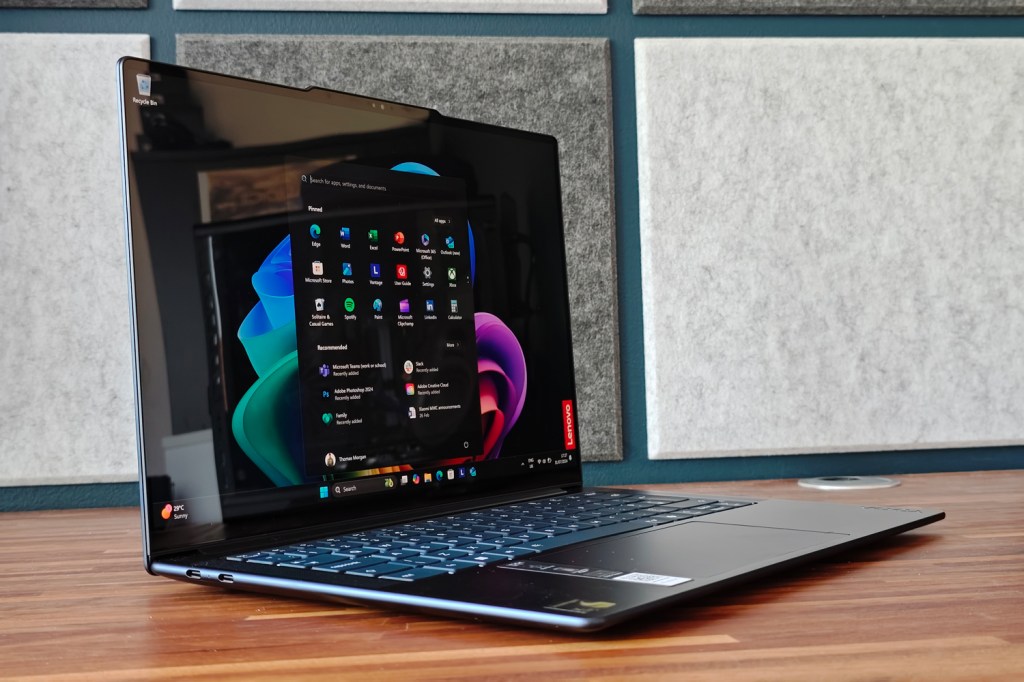
8. Lenovo Yoga Slim 7x
| Lenovo Yoga Slim 7x specs | |
|---|---|
| Screen | 14.5in, 2944×1840, 90Hz OLED |
| Processor | Snapdragon X Elite X1E-78-100 |
| RAM | 16GB |
| Storage | 512GB/1TB |
| Graphics | Adreno integrated graphics |
| OS | Windows 11 |
| Connectivity | 3x USB 4 |
| Dimensions | 325x225x12.9mm, 1.28kg |
The Lenovo Yoga Slim 7x is an excellent all-round ultraportable, and while not without flaws, it offers a strong alternative to the MacBook Air. We love the sleek, lightweight design and the stunning OLED display, which is perfect for work and entertainment. The laptop’s battery life is impressive, lasting nearly as long as the MacBook Air, making it great for all-day use without needing a charger. However, it does fall short in a few areas, like limited connectivity (only three USB-C ports) and some software compatibility issues due to its ARM architecture.
Windows on ARM still faces occasional stumbling blocks, with some apps not playing well with the system. We also find the AI features, while promising, don’t quite live up to the marketing hype. That said, performance in most desktop tasks is excellent, and the device handles office work, browsing, and light creative tasks smoothly.
For those of us prioritizing portability, battery life, and a vibrant screen, the Yoga Slim 7x is a fantastic choice. But for gaming or graphics-heavy tasks, you may want to look elsewhere. Overall, it’s a great all-purpose laptop if you can work within the ARM ecosystem’s limitations.
- Read more: Lenovo Yoga Slim 7x review
Best laptop for power users

9. Asus ROG Zephyrus G16
| Asus ROG Zephyrus G16 specs | |
|---|---|
| Screen | 16, 2560×1600 OLED w/ 120Hz, G-Sync |
| Processor | Intel Core Ultra 9 185H |
| RAM | 16/32GB |
| Storage | 2TB SSD |
| Graphics | Nvidia RTX 4090 |
| OS | Windows 11 |
| Connectivity | HDMI 2.1, 2x USB3.2, 2x USB-C, 3.5mm audio port, SD card reader |
| Dimensions | 354x246x14.9~17.4mm, 1.95kg |
The Asus ROG Zephyrus G16 blends gaming power with creative versatility, offering a fantastic OLED display and top-tier performance. Its design, reminiscent of Apple’s MacBook Pro, is sleek and sophisticated. At just 1.95kg and 17.4mm at its thickest, it’s impressively portable for a gaming laptop.
With Intel’s Meteor Lake CPU and Nvidia’s RTX 4090, the G16 delivers stunning desktop performance and gaming prowess. It handles everyday tasks effortlessly and offers smooth gameplay, thanks to G-Sync technology. The 2560×1600 OLED display, while not 4K, shines with rich colors and excellent contrast, making games and creative work look brilliant. However, the keyboard on the silver model suffers from hard-to-read backlighting, and the lack of an Ethernet port might bother some.
This laptop stands out not just for gaming but for creative use, with studio-certified drivers and AI smarts. While it’s monstrously expensive at top specs, the G16’s blend of power, portability, and premium build quality make it highly appealing. It competes with Razer’s Blade 16 but remains a top choice for gamers and creators who travel. We believe it’s the ultimate all-in-one machine for serious work and play.
- Read more: Asus ROG Zephyrus G16 review
Best 2-in-1 laptop
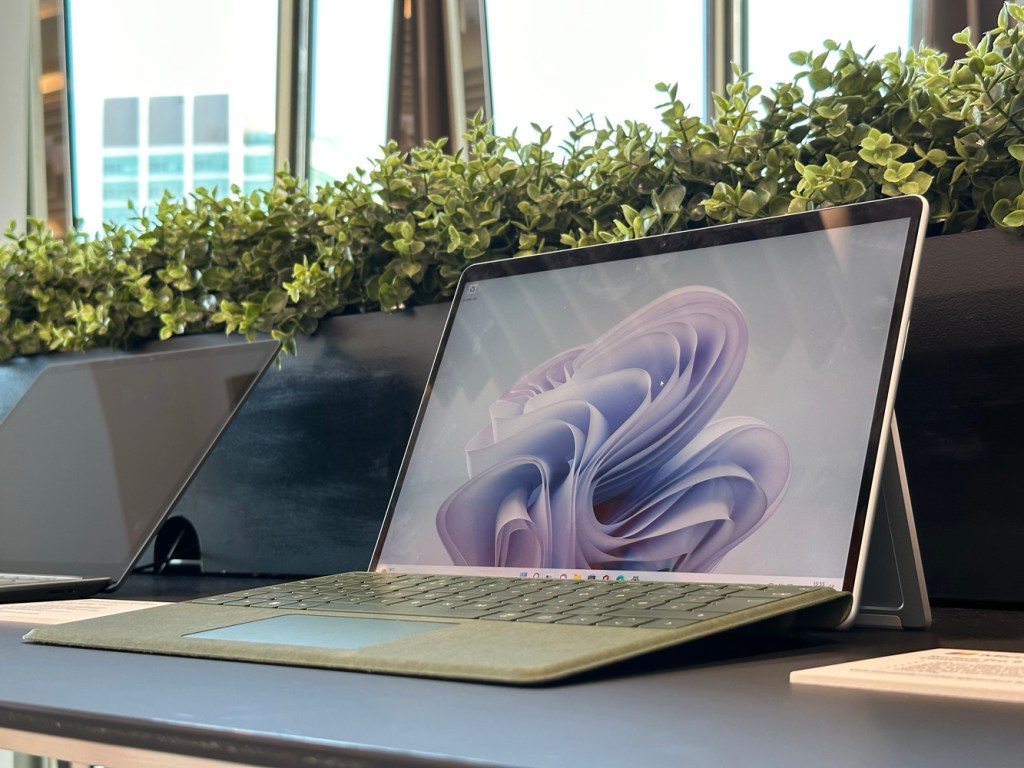
10. Microsoft Surface Pro 9
| Microsoft Surface Pro 9 specs | |
|---|---|
| Screen | 13in PixelSense Flow Display, 2880 X 1920, 3:2, 120Hz |
| Processor | 12th generation Intel Core i5 or i7 |
| RAM | Up to 32GB |
| Storage | 128, 256, 512GB or 1TB |
| Graphics | Intel Iris Xe Graphics or Adreno 8CX Gen 3 |
| OS | Windows 11 |
| Connectivity | 2 x USB-C, Surface Connect port |
| Dimensions | 287 mm x 209 mm x 9.3 mm, 879kg (tablet only) |
The Microsoft Surface Pro 9 is a top-notch 2-in-1 device, offering impressive performance in a sleek, portable package. For those of us who prioritize versatility and mobility, it’s an excellent choice, whether we’re working, gaming, or streaming. The lightweight build and sharp 13-inch PixelSense touchscreen make it easy to carry around and perfect for on-the-go use.
However, to get the best experience, we need to pick the right model. We should avoid the ARM-based version due to limited app support and opt for the Intel Core i5 or i7 models, which deliver enough power for multitasking, creative work, and even gaming. The display is fantastic, with vibrant colors and a 120Hz refresh rate, making it ideal for streaming or cloud gaming.
That said, the device can get pricey. Adding essentials like the keyboard cover and stylus, which aren’t included, can increase the cost significantly. While Microsoft claims 15 hours of battery life, in real-world use, especially for gaming or streaming, we’re more likely to get about five hours.
Overall, the Surface Pro 9 stands out for its excellent performance, brilliant display, and portability, but costs can quickly add up if we want the full experience.
- Read more: Microsoft Surface Pro 9 review
Best Chromebook
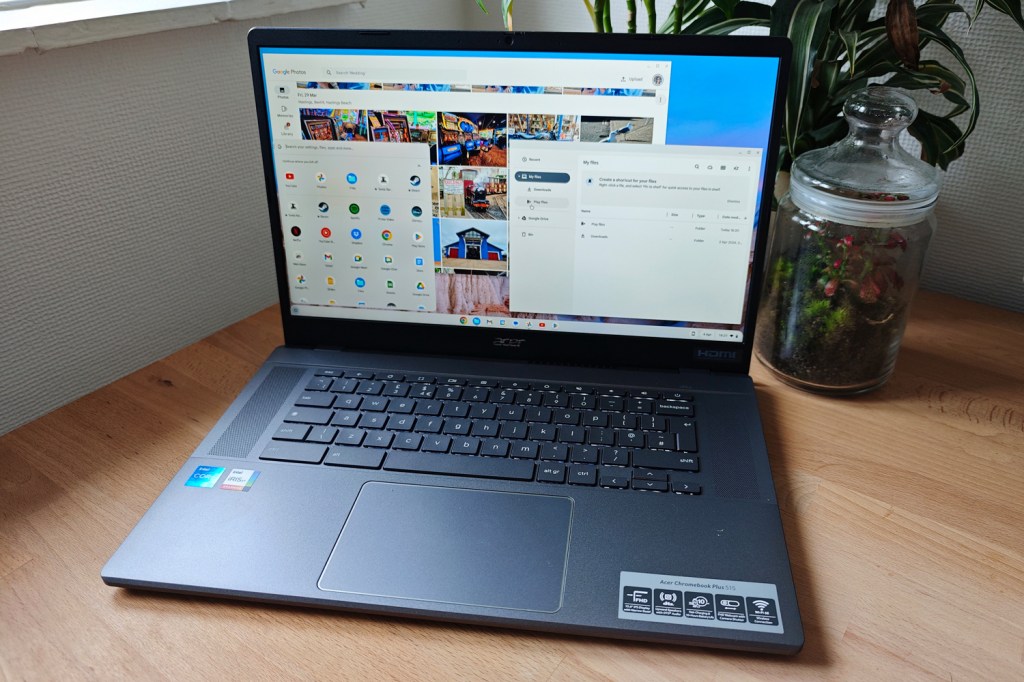
11. Acer Chromebook Plus 515
| Acer Chromebook Plus 515 specs | |
|---|---|
| Screen | 15.6in, 1920×1080 IPS LCD |
| Processor | Intel Core i5-1235U 10-core |
| Memory | 8GB RAM |
| Graphics | Intel Iris Xe |
| Storage | 256GB SSD |
| Operating system | Chrome OS |
| Connectivity | 2x USB-C, 1x USB, HDMI, 3.5mm headset port |
| Dimensions | 361x238x19.9mm, 1.68kg |
The Acer Chromebook Plus 515 offers a significant hardware upgrade for Chrome OS users, making it a great everyday option for those familiar with Chromebooks from school. We appreciate its powerful Intel Core i5 processor, 8GB of RAM, and 256GB SSD, which deliver excellent performance for multitasking and even light gaming. The Full HD 15.6-inch display is sharp and colourful, though not as bright as we’d like in sunny environments.
We love that it’s lightweight and portable, despite its larger screen, and the sturdy build quality is reassuring for everyday use. Connectivity options are plentiful, with USB-C ports, HDMI, and more, though it’s a shame there’s no card reader. The keyboard and touchpad are spacious and comfortable, making long typing sessions easy.
Battery life is solid, lasting around 8-9 hours of video playback, which should get us through a full day of work or study. However, the lack of a touchscreen and somewhat plain design may be drawbacks for some.
Overall, if we’re looking for a budget-friendly laptop that’s powerful and long-lasting, the Acer Chromebook Plus 515 is an excellent choice—especially for those who don’t need Windows software. It’s an affordable step up for Chrome OS users.
- Read more: Acer Chromebook Plus 515 review
What to look for when buying the best laptop
Buying the best laptop can be a daunting task, but fear not – Stuff’s laptop experts are here to help you make the right decision. Rather than spending hours comparing specs and features, the best way to choose a new machine is to ask yourself two key questions:
- What do I want to do with it?
- What might I want to do with it a year from now?
A bit of future-proofing goes a long way, especially since most modern laptops aren’t built for internal upgrades. Choosing wisely now can save you from scrambling for extra accessories later.
Let’s break it down by usage scenario:
- For general everyday use – like browsing the web, online shopping, managing your inbox and watching the odd Netflix show – a basic laptop with an Intel Core i3 or AMD Ryzen 3 processor, 8GB of RAM and 256GB of storage will do just fine. Chromebooks are a great shout here: fast, secure, and often excellent value.
- For professionals and creatives – think photo editing, video production, 3D design, or heavy multitasking – you’ll want something with real muscle. Look for at least an Intel Core i7 or Apple M3 chip, 16GB or more of RAM, and a dedicated GPU (like an Nvidia RTX 4060) if your workflow includes rendering or complex visuals. High-resolution displays with accurate colour reproduction are a must for content creators.
- For gamers – a powerful GPU is non-negotiable. Gaming laptops in 2025 now come with Nvidia’s RTX 40-series and AMD’s RDNA 3 chips, capable of smooth gameplay at high settings. You’ll want at least a 144Hz refresh rate display, ideally Full HD or QHD, backed by a fast CPU (Intel Core i7+, AMD Ryzen 7+) and a minimum of 16GB RAM. SSD storage also helps reduce game load times significantly.
- For students or commuters – portability matters. If you’re lugging your laptop around all day, something thin and light with all-day battery life is key. Look for 13in to 14in screen sizes, fanless designs, and ARM-based chips like Apple’s M-series or Qualcomm’s Snapdragon X Elite. Weight under 3lb (1.4kg) is the sweet spot for portability without sacrificing usability.
- For remote workers or frequent travellers – connectivity and battery life are crucial. Think 5G options, multiple USB-C/Thunderbolt ports, a solid webcam and microphone, and battery life of 12+ hours. Business-class ultrabooks like the Dell XPS 13 or Lenovo ThinkPad X1 Carbon still reign supreme in this category.
- For hobbyists and future dabblers – maybe you’re just dipping your toe into video editing or coding now, but think you might get more serious later. In that case, it’s worth going one tier up. A laptop with a mid-range CPU (Intel Core i5 or Apple M2), 16GB RAM, and decent integrated graphics can keep up as your needs evolve.
Also, keep in mind that storage space can fill up faster than you think. Many budget laptops come with just 128GB or 256GB SSDs – which may not cut it if you’re storing large files, media libraries or chunky games. If in doubt, go bigger, or ensure you’ve got a plan for cloud storage or external drives.
It’s always worth remembering: if the perfect laptop is just a little too expensive, you can often pick up last year’s model for much less. Refurbished laptops – especially directly from the manufacturer or trusted resellers – can offer top-tier performance for budget-tier pricing.
And of course, once you’ve got a rough idea of what you need, you’ll also want to think about your preferred platform:
- Apple MacBooks are incredibly well-optimised and great for creatives, with top-notch build quality and battery life. They play nicely with other Apple devices, and the M-series chips continue to impress in performance and efficiency.
- Windows 11 laptops come in every flavour imaginable – from bargain-basement machines to cutting-edge gaming beasts. Perfect for office work, PC gaming, and custom setups.
- Chromebooks are best for lightweight computing and students. If you live in Google Docs and don’t need demanding apps, they’re a fuss-free option.
Of course, it’s also worth considering a tablet. Many of the best tablets, such as Apple’s iPads and Samsung’s Galaxy Tabs, can become very laptop-like with the addition of the right keyboard. For more help making this decision you can read Stuff’s Laptop or tablet: which is best for you?
- Read more: How to choose a laptop to suit you
Premium laptops vs cheap laptops: what are you paying for?
When shopping for a laptop, it’s tempting to zero in on the price tag – but not all pounds and pennies are created equal. A £400 laptop might seem like a steal, but if it struggles to open more than a few browser tabs or has a battery that can’t survive a lecture, it might actually cost you more in frustration and time.
Here’s how to think about value, not just price:
- Budget laptops: Ideal for light tasks, web browsing and streaming. But corners are often cut – expect plastic builds, low-resolution displays, and slower storage. That said, a well-specced Chromebook or a discounted previous-gen Windows machine can be excellent value in this range.
- Mid-range laptops: This is where value sweet spots live. You’ll find snappier performance, better displays, more storage and longer-lasting batteries. Ideal for students, remote workers and casual creatives. Often, mid-range machines share internals with pricier models – just without the flashy design or high-end screens.
- Premium laptops: Here, you’re paying for top performance, ultra-slim designs, premium materials (hello aluminium unibody), cutting-edge processors, and features like OLED screens, fast charging, and dedicated GPUs. High upfront cost, yes, but also long-term reliability and resale value.
A good rule of thumb? Buy the best laptop you can comfortably afford, with an eye on longevity. An expensive laptop that serves you for five years is better value than a cheaper one that needs replacing after two.
The future of laptops: what’s coming next?
Modern laptops already feel like a big leap forward – but there’s much more change on the horizon. One of the most significant shifts is the rise of AI-enhanced features, powered by dedicated neural processing units (NPUs). These chips are designed to handle on-device intelligence, enabling everything from real-time transcription and background blur in video calls to smarter photo editing and even predictive typing. With Microsoft’s Copilot+ and Apple’s upcoming AI-powered macOS features, your laptop will soon feel more like an active assistant than a passive tool.
We’re also seeing a dramatic transition to Arm-based processors, led by Apple’s M-series and followed by Qualcomm’s Snapdragon X Elite chips for Windows. These chips offer impressive power efficiency, silent operation and all-day battery life – a massive step up from the hot, power-hungry Intel machines of the past. Expect more laptops to embrace this architecture, particularly as software catches up.
Displays are getting a big glow-up, too. OLED and mini-LED tech, once reserved for top-tier models, are trickling down into mid-range machines. Expect richer colours, deeper blacks, and high refresh rates to become more common, even on non-gaming laptops.
Another welcome trend is repairability and sustainability. More brands are using recycled materials, offering longer support, and making it easier to replace batteries and parts – something both eco-conscious buyers and right-to-repair advocates are cheering for.
How we test the best laptops
We’ve reviewed countless laptops over the years, so you can trust our recommendations. We have a thorough review process, which includes running benchmark tests, as well as using the laptop just like a regular consumer would.
We’ll start a review by assessing the laptop’s physical design, taking into account build quality, weight, screen size, and quality of the keyboard and trackpad. This is important as laptops need to be robust and lightweight, especially if they’re being carried around in a backpack every day.
We’ll then run some benchmark tests to see how the laptop performs.
Perhaps more importantly, we’ll see what it’s like to live with the laptop, using it every day just like a consumer would. This test could include using it for work, running multiple apps, watching films and listening to music.
Of course, it also allows us to test every little detail of the laptop that could get missed, such as how long it takes to charge, how clear the webcam is, whether the display is bright enough in direct sunlight, and if there are enough ports. Basically, we leave no stone unturned when it comes to reviewing laptops.
For more information on Stuff’s rating and review process, read our page on how we test products.


